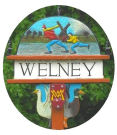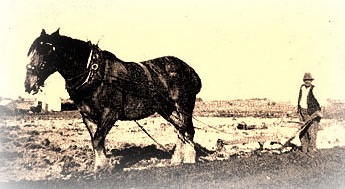
The Welney Website
Pates Farm, Tipps End
page created June 2006, amended/updated Saturday, 18 October 2014

INTRODUCTION
Pates Farm, off Wisbech Road, Tipps End/Tipsend, is part of Norfolk County Council's Welney Estate of tenanted farm holdings. The farmhouse and yard are on the west bank of the Old Croft River which here is the parish boundary, so they are actually in Upwell Parish.The farm is the home of the Goodger family and is the base for their farming operations. The farm also houses the headquarters and distillery of a co-operative of which they are members, Norfolk Essential Oils.
The following information is from the Goodger family's information leaflets produced for their farm open day in June 2006.
"Pates Farm is situated on the Norfolk/Cambridgeshire border. The county boundary runs around the western perimeter of the farm. The Farm is now the centre of operations for the Goodger family who have farmed in Welney and the surrounding area for the last 70 odd years. The current farmers have been at Pates Farm for 8 years. The farm extends to some 500 acres for this season, some of the land is owned and the rest is tenanted from various land lords. The land is predominantly grade one silt with some more difficult darker soils known locally as skirty type soil.
Crops grown are 200 acres Wheat, 15 acres Oil Seed Rape, 36 acres Spring Beans, 55 acres Sugar Beet, 70 acres Potatoes, 26 acres Onions and 75 acres herbs for Essential Oils production. The land does not have irrigation and generally the crops grow well on the fertile silt soils.
Wheat is sold through the Fengrain co-operative at Wimblington and the crops are grown for animal feed, biscuit flour and bread flour. The biscuit wheat is often delivered to Heygates Mill in Downham Market. Oil seed rape is grown for seed production and for its oil which is used in cooking and can be used as bio-diesel.
Spring beans are grown for Human consumption and as a seed crop.
Sugar beet goes to the British sugar factory at Wissington and is used in 'Silver Spoon' sugar. This is a much mechanized operation and contractors Russell company harvest the beet with large 9 row machines which cost around £300,000 and have made this a specialized operation.
The potatoes are marketed through the Greenvale Company and the farm is a member of AP Growers which is the co-operative arm of Greenvale AP. The potatoes grown are all 'Maris Piper' and this year 60% of the crop is pre-sold to McCain's who will make them into their familiar chips. The remaining 40% will most likely go to fish and chip shops. Around 60% of the crop is stored on farm after lifting for sale during December through to May.
Onions have been marketed through the Holus group and the farm has been supplying onions to Asda for about 10 years now on a regular basis. Morrison's have also been a recipient of the onions. These are stored off farm in rented storage through to January when they will be graded and pre-packed for the supermarket.
Herbs are grown for essential oils and are all distilled in the Norfolk Essential Oils distillery which is situated on the farm. The Distillery is a farmer co-operative and is run for the benefit of all the farmers in the group. Herbs grown at Pates farm include Chamomile, of which there are two types, Roman (also known as English) and German; Yarrow, Hyssop. Melissa, Peppermint, Hemp and Clary Sage. The crops are cut with a mower like that used for hay and allowed to wilt for 24 to 48 hours before being taken to the distillery in the special loading wagon that lightly chops the crop before it is placed in the large distillation vats. The crop then has very hot steam passed through it for 1 to 2 hours in most cases and this extracts the oil from the flowers and leaves, the hot steam with oil then cools and the oil floats on the surface of the oil where it is collected, filtered, dried and then bottled for storage before selling to companies like The Body Shop who use it in bath and aromatherapy products.
The farm is part of two crop assurance schemes, the combinable crops scheme which verifies all the grain crops the assured crops scheme which verifies the potatoes, herbs and onions
The farm only employs contractors to harvest and cart the sugar beet crop, all other work is done by the family. Onion lifting equipment is co-operated with Frank Hartley and Sons, and combine and drill operation is shared with Wesley Poole who is a close neighbour. Grading of potatoes for fish and chip shop sales is carried out by HG Bliss of Christchurch. More and more of this type of sharing and co-operation is necessary to cut costs in order for these family farms to survive.
The farm has taken 16 acres of land out of food production and cropped it down to environmental areas such as 6 metre strips around field margins like ditches, this creates good habitats for small mammals, birds and insects. Other areas will be wild flowers, and wild bird seed areas. We hope this will lead to greater wildlife diversity on this farm. This scheme is known as the Defra Entry Level Scheme and is part of the new way of funding environmental benefits rather than subsidizing over production of food."
| If you've visited this page before you may need to "refesh" the page to see the latest version by clicking the browser reload button |
|
Acknowledgements. © 2010 Welney Website |
In 2008, an archaeological survey found evidence of 17th century farming - see report..